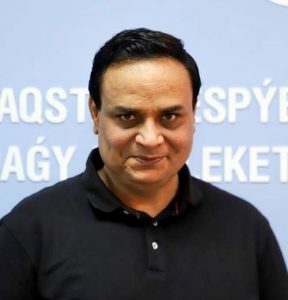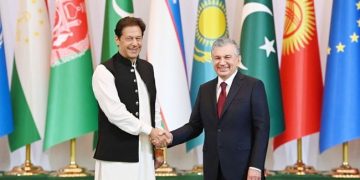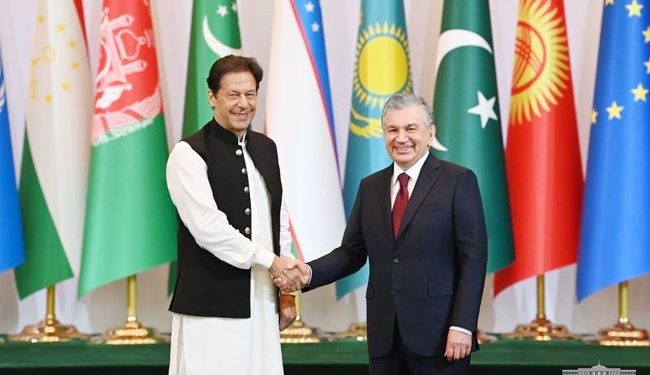
Director: Center for South Asia & International Studies (CSAIS) Islamabad Regional Expert: Uzbekistan & CIS
The historic visit of President H.E. Shavkat Mirziyoyev to Pakistan has been started. Business community and various chambers of commerce termed this visit as historic for the further strengthening of bilateral relations in terms of enhanced trade & commerce activities and joint ventures in preferential sectors.
In this connection, 2nd Pakistan-Uzbekistan Business Forum was held in Islamabad yesterday in which a large numbers of investors and businessmen of the private sector actively participated and discussed various befitting propositions and projects for the further strengthening of economic ties between two countries.
In this business forum adviser to PM on Commerce and Investment, Abdul Razak Dawood and the Deputy Prime Minister, Minister of Investments and Foreign Trade of Uzbekistan Sardor Umurzakov chaired the proceedings.
While addressing, the ‘Pakistan-Uzbekistan Business Forum Adviser to PM on Commerce and Investment, Abdul Razak Dawood highlighted huge potential for trade growth between Pakistan and Uzbekistan in various sectors once the Preferential Trade Agreement (PTA) is finalized.
Moreover, he hoped that the promotion of trade between the two countries would increase regional trade, besides providing trade connectivity to the all the regional countries including Russian Federation and European markets. He said that the PTA would increase bilateral trade between Pakistan and Uzbekistan.
It hoped that the signing of the agreement would take place during the Uzbek president’s visit to Pakistan on March 3 to 4, to facilitate bilateral trade and transit trade to boost trade ties between the two countries and also enhance the connectivity with Afghanistan, the adviser said. He shared that a strong economic bloc could be established among Pakistan and Afghanistan and the five Central Asian countries, which would enable trade in goods to reach Russia and European countries.
He said that there was a possibility of mutual agreement for smooth transactions between the central banks of the two countries. In addition, the facilitation of transit trade between the two countries will be discussed.
He further added that an agreement has already been reached in that regard and now transit trade trucks would be able to supply goods between Pakistan, Afghanistan, and Uzbekistan, which would boost trade in the region. Similarly, the promotion of transit trade and the free moments of trucks would usher in a new era of trade promotion in the region, he said.
On his part, the deputy prime minister and trade minister of Uzbekistan said that Pakistan and Uzbekistan bilateral trade increased by 70 percent in last two months of January and February 2022. He insisted for industrial and investment cooperation between the two countries and said that business communities from both needed to jointly work for increasing the bilateral trade between.
He hoped that the 350 million markets of Pakistan, Afghanistan, and Central Asian countries could play a significant role in world trade. The deputy prime minister said that leadership on both sides agreed to the promotion of bilateral trade and regional economic integration.
He further said that after the visit of Prime Minister Imran Khan in July 2021, new avenues of mutual relations and cooperation were opened between the two countries, which also opened the way for the development of trade and economic relations. He said that the traders and business community of both the countries had to play their due role in promoting trade in the region. In that regard, the government of Uzbekistan would provide all possible facilities to Pakistani traders, he added.
He assured that the government of Uzbekistan would take steps to make legal and financial and visa issues as easy as possible for the business community. He said that the business community of the two sides could share their mutual experiences and get the benefits from the experience of each other for increasing the economic connectivity.
During the business forum five MOUs were signed between the private sector of the two sides to enhance cooperation in different potential sectors including textile, fertilizer, weaving and dyeing, construction and menthol supplies.
Modern concepts of “commercial diplomacy”, “shared prosperity”, “economic corridors”, “connectivity” and “globalization 2” have devised new means of economic progress and prosperity, sustainability, human survival, productive channels and green future.
Now Uzbekistan’s “Double Landlocked Syndrome (DLS)” has been successfully “converted” into an ideal hub of FDIs, joint ventures, industrialization and green energies through implementation of constant structural economic reforms.
Uzbekistan initiated “Massive Drive of Diversification of Economy (MDDE)”, “Pragmatic & Friendly Foreign Policy Module (PFPM)” and last but not the least, “Holistic Model of Connectivity (HMC)” based on “shared prosperity” has now been getting “momentum” and new “heights” since the start of presidency of Shavkat Mirziyoyev 2017. It has further accelerated after the announcement of ten policy initiatives by president Mirziyoyev during the historic international conference of 2021.
In this connection, his ten policy measures has now been termed as “Ten Commandments of New Economic Order” which actually stimulated spirits of greater regional connectivity, immense socio-economic integration, massive industrialization, persuasion of green energies, energy & food security, investments, eradication of poverty, and last but not least, systemization of fight against terrorism, radicalization, drugs and human trafficking and streamlining of peace and stability in the region and beyond. Pakistan being the “ideal” “connecting” hub between Central Asia Region (CAR) and South Asia Region (SAR) with “easiest & shortest” route, has been working hard to further strengthening the diplomatic ties with all the CAR especially the Republic of Uzbekistan in diverse fields of economy, trade & commerce, joint venture, foreign direct investment, food & energy cooperation, civil aviation, direct linkages, textiles, garments, automobiles, agro-economy, manufacturing, chemical engineering, banking & finance, Islamic banking, micro-financing, insurance, science & technology, medical sciences, educational cooperation and last but not least, cultural cooperation.
Hopefully, ongoing visit of Uzbekistan president Mirziyoyev to Pakistan would further enhance its role as a “reliable conductor” and “vital stabilizer/equalizer” of all Central Asian states. Moreover, it will further strengthen Tashkent regional stature. Pakistan will also be benefited from increasing close ties with Uzbekistan which is indeed a gateway of Central Asia and has borders with Turkmenistan, Kazakhstan, Tajikistan, Kyrgyzstan and Afghanistan.
Visionary leaderships of Uzbekistan and Pakistan H.E. Shavkat Mirziyoyev and Imran Khan have already “redefined”, “rephrased”, re-shaped”, re-planned and re-implemented noble concept of regional connectivity by announcing numerous befitting Zero Customs Duties Regimes (ZCDRs), beneficial Strategic Oriented Policies/programs (SOPs), doable Trans-Regional Railway Project (TRP), the Innovative & Integrated Transportation System (IITS), TIR Carnets, Preferential Treatment Facility (PTFs) at Karachi Port Trust (KPT) and Gwadar seaports, the Quadrilateral Traffic in Transit Agreement (QTTA) and last but not least, Cluster Trading Scheme of Arrangements (CTSAs). Hopefully upcoming visit of Uzbekistan president will be game changer.
Critical analysis reveals that Uzbekistan’s Holistic Model of Connectivity (HMC) is primarily based on its macro-economic stability, sustainability and “transformation” through rigorous “structural reforms” initiated by the leadership of Shavkat Mirziyoyev which has now enabled his country to “expand” its trade & commerce relationship beyond the immediate neighborhood of the CAR. In this context the upcoming presidential visit will be instrumental.
Critical analysis indicates that the total volume of investments over the past 4 years has increased by more than 2.1 times, including foreign investments by 2.7 times. The share of investment of GDP in 2019 exceeded 38 percent for the first time, which created a solid foundation for ensuring economic growth in the coming years.
According to the latest EBRD (December 2021) forecasts, Uzbekistan’s GDP will grow by six in 2022 the fastest growing economy in Central Asia. It seems that Uzbekistan has managed to strengthen the competitive position of its economy relative to the economies of other countries.
The World Bank (2021) described the new stage of reforms as follows: “Uzbekistan is moving to reforming the market for rights to use and own land, creating a capital market, and transforming state-owned enterprises.
Despite the pandemic, the volume of production in the agricultural sector increased by 3, the service sector by 2.3, and industry 0.7. The positive dynamics of production is noted in all sectors of the economy. There was also a significant increase in wages. All indicators clearly indicated a confident positive dynamics of recovery processes.
Industrial production generated from the more high-tech manufacturing industry, whose share in GDP increased from 11.5 percent in 2016 to 19.6 percent this year. The service sector also developed dynamically, which during this period increased annually by an average of 12 percent per year. At the same time, the agricultural sector, maintained a steady growth.
Numerous administrative barriers for business have been eliminated, interference in entrepreneurial activity is prohibited, and the business climate for entrepreneurs has improved.
In 2016, the number of registered small businesses was 278 thousand, in 2021 503 thousand. In 2016, the number of newly created enterprises was about 28 thousand, in 2021 95 thousand.
The Strategy of the Investment Policy of the Republic of Uzbekistan until 2025 is being implemented. It covers the further development of the securities market, the expansion of the investment potential of commercial banks, the formation of a diversified capital market, an increase in the investment opportunities of enterprises, the active involvement of public funds in investment activities, as well as an increase in the efficiency of allocation of public funds.
It is estimated that over the next five years, the share of investment in GDP will remain at about 30 percent, or $ 120 billion, of which at least 70 billion will be foreign investment. Within the framework of public-private partnership projects, it is planned to attract $ 14 billion in the development of transport, road construction, water management and other areas.
The government of Uzbekistan also plans to create a Development Bank to stimulate industry and improve infrastructure in the regions.
In the area of reforming the banking system, tasks were set to ensure the stability of the level of capitalization and the deposit base of banks, and to expand lending.
In 2018-2020, the number of credit institutions in Uzbekistan increased by 55 units. As of January 1, 2021, the assets of commercial banks reached 366.1 trillion soums, an increase of 120 percent compared to 2017. The total volume of loans issued to sectors of the economy amounted to 277 trillion soums, an increase of 150 percent compared to 2017. The real growth of loans during this period averaged 38.6 percent per year, and the growth of deposits 18.5.
Interestingly, domestic commercial banks for the first time in history began to enter the international capital market. Uzpromstroybank, National Bank for Foreign Economic Affairs, Ipoteka Bank issued Eurobonds to attract long-term capital, attracting funds from the London Stock Exchange. The German Development Financial Institute and Triodos Investment Management have invested in the authorized capital of Ipak Yuli Bank through the purchase of shares. It is economic reality that about 50 percent of the country’s GDP and one-fifth of the volume of foreign trade are created by state-owned enterprises, which provide more than half of the state budget revenues.
However, holistic reforms about the liberalization of state-owned enterprises are now being carried out, which provides for large-scale privatization, reducing the state’s participation in the authorized capital of economic entities, introducing market-based management principles at state-owned enterprises and creating additional opportunities for attracting private capital.
Stronger anti-corruption efforts and tougher protections for human rights, including the rights of entrepreneurs and owners are achieving wonders.
Moreover, Uzbekistan’s cotton industry and rich natural resources such as gold and natural gas offer attractive opportunities for investors. The government’s declared economic policy prioritizes the attraction of private investments through improvement of Uzbekistan’s business climate, privatization, and liberalization of foreign trade.
Fitch maintains Uzbekistan’s outlook as stable, while S&P has recently changed it from negative to stable, and Moody’s upgraded it from stable to positive. Furthermore, Uzbek government declared that the government has set its goal to increase per capita GDP from the current $1,700 to $2,500 by 2025, and $4,200 by 2030.
I would like to suggest that enhanced banking & financial integration and cooperation are must for the further strengthening of bilateral relations between the two sides. Swapping of currencies may provide both the countries and its private sectors a sense of easiness and security. Close liaison in diverse sectors of Islamic Banking, Micro-Financing and SME may further enhance economic relations between the two countries in the days to come.
Befitting propositions in agriculture, vegetables, fisheries, pharmaceuticals, sports commodities, textiles, garments, automobiles and last but not least dry-fruits may revolutionize bilateral trade between Pakistan and Uzbekistan. “Colored” cotton and newly cultivated crop of “Saffron” of Uzbekistan would be a value-addition for mutual agriculture cooperation. Joint ventures in affordable automobiles may open a grand opening for both the countries private sectors for making huge investments.
Tourism may be further accelerated by forming a Joint Tourist Company (JTC). Pace of infrastructural development and cooperation may also be patronized by forming a joint Infrastructural Development Company (IDC). A Joint Chamber of Commerce (JCC) would be a confidence booster for the private sector. Reciprocal Trade Houses (RTHs) would be a value-addition for promoting trade & commerce activities between the two countries in the future.
To conclude formation of Corridor of Knowledge (CK) would further enhance educational, cultural and last but not least, people-to-people ties between Uzbekistan and Pakistan. In this regard, The Center of South Asia & International Studies (CSAIS) may play a vigorous role because of its vast and dynamic experts and expertise. Its constant persuasion in terms of holding constructive regional dialogues with (ISRS, Uzbekistan, Foreign Policy Institute of Turkey etc.) is now paying dividends in terms of greater regional cooperation and connectivity.




